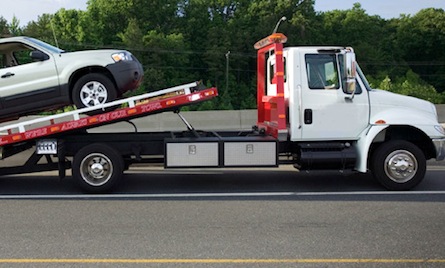State lawmakers changed the Illinois Vehicle Code for 2012 to regulate how municipalities tow vehicles after an arrest for driving under the influence. The police practice of towing a vehicle after a DUI arrest has been generally unregulated by state law until now. In the past, each city had its own procedures for towing, the imposition of fees, and administrative hearings to contest the fees. Basically, it was a game with no rules except the city would always win.
The new law is found at 625 ILCS 5/11-208.7. The statute establishes all the reasons why a vehicle may be towed, such as where it was used in the commission of a criminal offense. Additionally, the statute provides the minimum requirements for notifying the vehicle’s owner in cases where someone other than the owner was driving the vehicle and was arrested for DUI. And it provides the minimum requirements of due process where a person wants to contest the impoundment and fees.
One of the requirements is that the hearing officer must be a licensed attorney with at least three years experience. This is a much-needed requirement. I represented a client once in an administrative hearing with a village that towed my client’s vehicle after a DUI. The hearing officer who presided over the hearing was none other than the town mayor, who just argued with me as to why his village should be able to keep my client’s money.
The new statute provides a method for appealing an adverse ruling, too.
But not all parts of the new law favor the vehicle’s owner. The police are required only to make a “reasonable” attempt to notify the owner, and what is “reasonable” is undefined. Hypothetically, the owner may never be aware of the impoundment and lose the vehicle.
The statute provides a strict timeline in which the vehicle must be retrieved otherwise it is forfeited to the municipality. The law says that the owner must retrieve the vehicle prior to 35 days:
Vehicles not retrieved from the towing facility or storage facility within 35 days after the administrative hearing officer issues a written decision shall be deemed abandoned and disposed of in accordance with the provisions of Article II of Chapter 4 of this Code.
625 ILCS 5/11-208.7(h).
And the last section of the statute adds a penalty that did not exist before. In cases where the vehicle is towed and stored in impound for a long period of time, the towing and storage fees can be several thousand dollars. Often, these fees are greater than the value of the vehicle, and so the owner decides to leave it.
But the new statute says that even where the person has given up the vehicle rather than pay the towing and storage fees, the municipality can sue him for the total. This provision, in effect, allows the town to get paid twice: once for selling the vehicle at auction, and twice for the fees.
Read the paragraph:
Unless stayed by a court of competent jurisdiction, any fine, penalty, or administrative fee imposed under this Section which remains unpaid in whole or in part after the expiration of the deadline for seeking judicial review under the Administrative Review Law may be enforced in the same manner as a judgment entered by a court of competent jurisdiction.
625 ILCS 5/11-208.7(i).
On balance, the statute is good because it provides some minimal protections to the owner that were lacking before (see my example of the town mayor acting as hearing officer yet arguing on behalf of his village). But as with all DUI statutes, it provides powerful laws to the municipal seeking to seize a person’s property.
One issue that may be problematic with the use of an attorney as a hearing officer is the fact that the attorney would presumably get paid by the municipality. It is a conflict of interest for an attorney to act as a judge in a dispute between two parties where he is being compensated by one of the parties.
But no one asked me for my opinion before this became the law.


